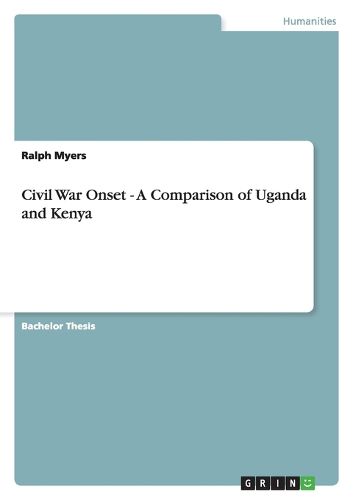Readings Newsletter
Become a Readings Member to make your shopping experience even easier.
Sign in or sign up for free!
You’re not far away from qualifying for FREE standard shipping within Australia
You’ve qualified for FREE standard shipping within Australia
The cart is loading…






Bachelor Thesis from the year 2010 in the subject Sociology - War and Peace, Military, grade: 73%, Dublin City University, course: International Relations, language: English, abstract: This paper poses the research question: what causes civil war? Since the end of World War II, both incidence and duration of civil wars have been on the rise, with disastrous outcomes for humanity. It is crucial that academics study this phenomenon and try to create theories which are able to explain and predict civil war onset for different countries. Two main competing theories have become prominent in the modern day literature surrounding the outbreak of civil war. On the one hand there are greed theorists employing econometric models to account for rebel opportunism. These theories centre around the notion that ethno-linguistically or religiously diverse countries experience civil war as a result of the incentive to rebel compared to the state’s ability to counter rebellion. Greed theories focus largely on the ability of rebel groups to recruit and finance themselves, in addition to a number of other variables, which make civil war more or less conducive. On the other side are advocates of the grievance theory who argue civil wars start as a result of grievances, built up as a result of political and material discrimination. Depending on the level of grievance in combination with the ability of ethnocultural groups to mobilise and the state’s response to initial protest, civil war occurs. This paper focuses on two case studies, with opposing dependent variables. The first is Uganda which has experienced multiple internal conflicts of varying intensity since gaining independence. The other is Kenya which has been spared the outbreak of a full-blown civil war, although it has experienced a number violent ethnic clashes. The case studies are relatively similar so as to control for third variables, yet chosen in such a fashion as to avoid bias or case fixing. For both countries
$9.00 standard shipping within Australia
FREE standard shipping within Australia for orders over $100.00
Express & International shipping calculated at checkout
Bachelor Thesis from the year 2010 in the subject Sociology - War and Peace, Military, grade: 73%, Dublin City University, course: International Relations, language: English, abstract: This paper poses the research question: what causes civil war? Since the end of World War II, both incidence and duration of civil wars have been on the rise, with disastrous outcomes for humanity. It is crucial that academics study this phenomenon and try to create theories which are able to explain and predict civil war onset for different countries. Two main competing theories have become prominent in the modern day literature surrounding the outbreak of civil war. On the one hand there are greed theorists employing econometric models to account for rebel opportunism. These theories centre around the notion that ethno-linguistically or religiously diverse countries experience civil war as a result of the incentive to rebel compared to the state’s ability to counter rebellion. Greed theories focus largely on the ability of rebel groups to recruit and finance themselves, in addition to a number of other variables, which make civil war more or less conducive. On the other side are advocates of the grievance theory who argue civil wars start as a result of grievances, built up as a result of political and material discrimination. Depending on the level of grievance in combination with the ability of ethnocultural groups to mobilise and the state’s response to initial protest, civil war occurs. This paper focuses on two case studies, with opposing dependent variables. The first is Uganda which has experienced multiple internal conflicts of varying intensity since gaining independence. The other is Kenya which has been spared the outbreak of a full-blown civil war, although it has experienced a number violent ethnic clashes. The case studies are relatively similar so as to control for third variables, yet chosen in such a fashion as to avoid bias or case fixing. For both countries